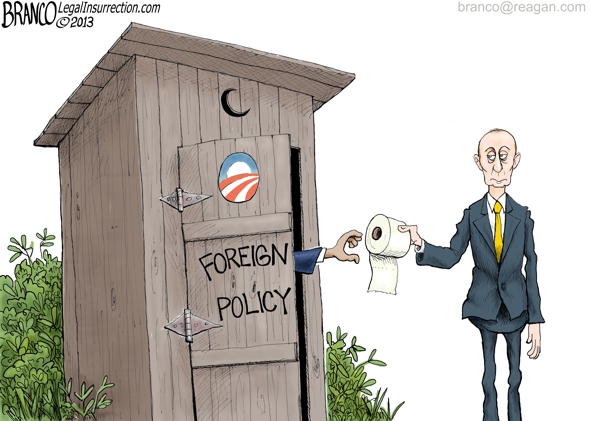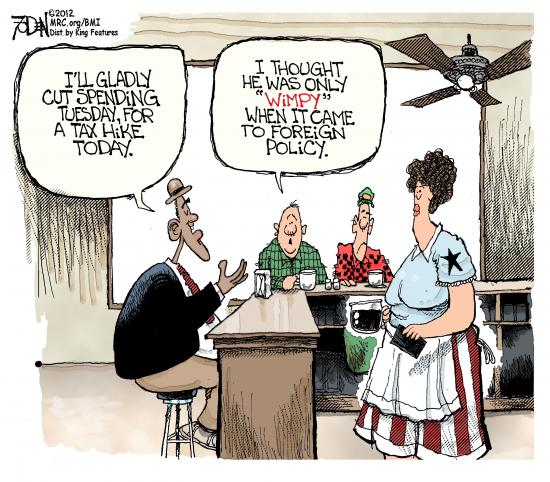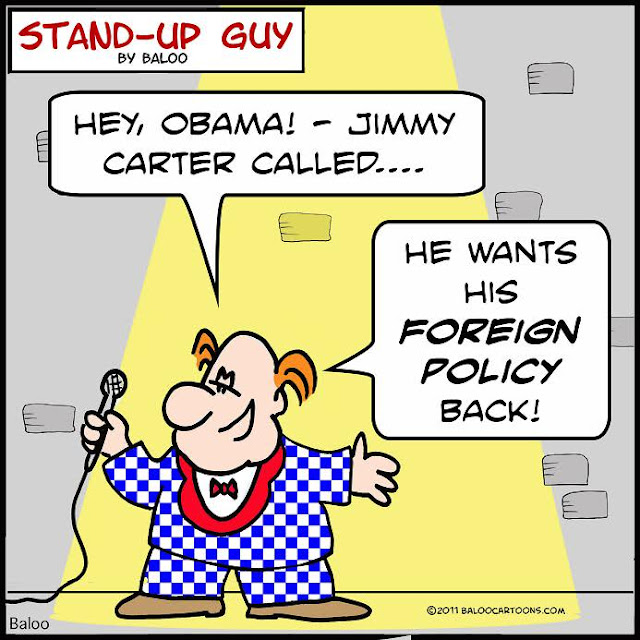Cartoon Of The Day
Obama’s Friends and Enemies
The Palin Doctrine
It looks like the “Liberal Media” is finally reading the handwriting on the wall and taking Sarah very seriously.
One of the things that’s starting to emerge on the Republican side of the political struggle is a world view that can be called the Palin Doctrine. It’s remarkable that none of the other leading figures in the party has come to be associated with a particular foreign policy trajectory. Can one think, say, of a Pawlenty Doctrine or a Daniels Doctrine or a even a Perry or a Schwartzenegger or a Romney Doctrine? They each have their own bona fides, but developing the outlines of a coherent foreign policy view isn’t one of them.
Governor Palin, by contrast, has been starting to give us a glimpse what could be expected of her in foreign affairs. This has been occurring in public appearances and broadcasts and, most pointedly, in a posting on June 30 her Facebook. So while the left has been mocking her for a supposed lack of depth or learning, she has been filling in, line by line, a picture of her foreign policy views, ranging over topics from the Navy (she’s for an expansion of the fleet), to a view of the war (she’s a hawk), to a view of the dollar (she’s against a weak dollar strategy), to a view of Israel (unflinching support).
This isn’t the first time talk of a Palin Doctrine has been in the news. As far back as September 2008, the phrase occurred in, among other places, a column by Arianna Huffington who likened Mrs. Palin’s to “Dick Cheney. With lipstick.” She noted, however, that the governor’s doctrine was still “under construction.” In the two years since then, the Alaskan has honed an increasingly cohesive and detailed world view. We’ve already noted her remarks in respect of the dollar, delivered in a speech in Hong Kong and on her face book page, as well as her willingness to breast the politically correct line on Israel.
One of the features of the Palin Doctrine is that the governor opposes what she calls an “enemy-centric” foreign policy. In marking this point she has picked up on the phrasing of one of the most sophisticated critics of President Obama’s foreign policy, Senator Alexandr Vondra of the Czech Republic. A one-time hero of the anti-Communist struggle, Mr. Vondra is a former Czech envoy in Washington and a former foreign minister.
The editor of the editorial page of the Washington Post, Fred Hiatt, issued a piece in May that paraphrased Mr. Vondra as saying whie America is “actively approaching Russia with its offer to ‘reset’ relations” and “Russia is assertively approaching the Czech Republic and other nations, driven by its enmity to NATO and its belief that it is entitled to hold sway in its own sphere of influence,” the “third side of that triangle — between the United States and allies — is inactive . . .creating a danger that nations and policies less amenable to U.S. values will fill the vacuum.”
Mrs. Palin faults the Obama administration for defaulting on Communist China, Iran, and says that when this is “coupled with less defense spending, it signals to the world that maybe we can no longer be counted on, and that we have other priorities than being the world leader that keeps the peace and provides security in Europe, in Asia and throughout the world.”
In sharp contradistinction to President Obama, Mrs. Palin is comfortable with America’s status as the world’s superpower. In her Facebook posting, she ridiculed the president for saying, “whether we like it or not, we remain a dominant military superpower.” She understands that most Americans take comfort from the fact that the military leadership in the world is held by America, and she comprehends that permitting that status to slip away would be a catastrophe — and not just for America.
Mrs. Palin has grasped that for every critic of American power there are thousands who comprehend that it is a force for freedom and democracy. Say what one will about her, but she is staking out ground that almost no Democrat and far too few Republicans have staked out. It’s the mark of a leader, and it’s hard not to think that it will prove promising ground to hold when we get closer to the election in 2012.


